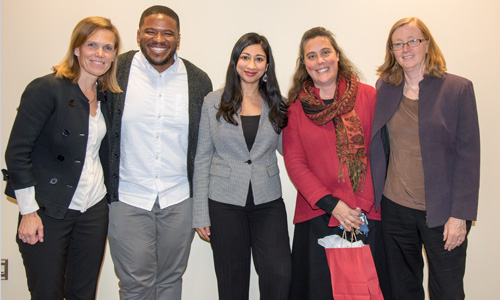Putting a Face on DACA
The presentation given by Jonathan Jayes-Green began with a simple declaration.
“I am Jonathan Jayes-Green and I am undocumented,” said the co-founder of the UndocuBlack Network, an advocacy group for undocumented African-Americans. “I know the stories that you hear about undocumented people and I just want you to see my face.”

From left, Kathleen Page, Jonathan Jayes-Green, Nalini Negi, Elizabeth Alex, and Maureen Sweeney.
Jayes-Green was among a panel of speakers discussing “DACA and Beyond: The impact of Restrictive Immigration Policies,” held recently at the University of Maryland, Baltimore (UMB). The event was co-sponsored by the University of Maryland School of Social Work and the University of Maryland Francis King Carey School of Law.
Other panelists included Carey Law Associate Professor Maureen Sweeney, JD, and Elizabeth Alex, MSW ’02, senior director of community organizing, CASA de Maryland. The evening was moderated by Nalini Negi, PhD, MSW, associate professor at the School of Social Work, and Kathleen Page, MD, associate professor, division of infectious diseases, at Johns Hopkins University and co-founder of Centro SOL, which promotes equity and health opportunities for Latinos.
Since the Trump administration began to dismantle Deferred Action for Childhood Arrivals (DACA) in September, the status of more than 800,000 undocumented U.S. residents has been in jeopardy.
Jayes-Green’s family arrived in the United States when he was 13, leaving their native Panama for better opportunities on a tourist visa. They arrived in Maryland and filed for residency, but the request was denied.
“And that is how I became undocumented,” he told the overflow crowd at UMB's Southern Management Corporation Campus Center. “Back then, in 2006, I didn’t’ really understand what undocumented meant until I tried to go to school. It really gets me because at that time we had bought into the American dream. Everyone’s heard about the American dream, that if you just work hard enough, you’ll be able to access all the opportunities in the world. If you work hard enough, you’ll be able to have a house with the 2½ kids and the white picket fence.”
During his high school years, he began to realize “maybe because of my undocumented status, the opportunities that I thought were available if I just worked hard enough were not available,” he said. “It really made my relationship to this country complicated and it’s gotten even more complicated since.”
CASA de Maryland recruited him to work on the Development, Relief, and Education for Alien Minors (DREAM) Act at the state level. He went on to build a career and own a car and a house.
“Regardless of what you’ve heard, I am here to stay,” he said.
Bruce Jarrell, MD, FACS, executive vice president, provost, and dean of the Graduate School, who attended the event on behalf of UMB President Jay A. Perman, MD, quoted former President Barack Obama’s comments about the dismantling of DACA.
“They were brought to this country by their parents, sometimes even as infants," Jarrell said, quoting from Obama's statement. "They may not know a country bedside our country. They may not even know a language beside English. They often have no idea that they’re undocumented until they apply for a job, a college, or a driver’s license. Therefore, whatever concerns or complaints Americans may have about immigration in general, we shouldn’t threaten the future of this group, the DACA group, of young people who are here through no fault of their own, who pose no threat, who are not taking away anything from the rest of us. Kicking them out won’t lower the unemployment rate, or lighten anyone’s taxes, or raise anybody else’s wages.”
Jarrell added: “I can’t think about any better way to say it than that. At the campus level, we have a deep commitment to making sure this is a welcoming and friendly international environment.”
Richard P. Barth, PhD, MSW, dean of the School of Social Work, also welcomed the audience, which filled the room to capacity, many people sitting on the floor because there were no seats left.
“One of the things that we hope that we can accomplish tonight is not only figuring out a way to embrace our DACA program participants, but to think more broadly,” he said. “There are many others who need the same opportunities that we hope we can get restored to DACA.”
Negi said 800,000 young adults' lives “were thrown into limbo” Sept. 5, the day that Attorney General Jeff Sessions rescinded DACA. “That only tells one part of the picture in some ways. What it doesn’t also share the story of is that we in this country also have 11 million undocumented immigrants. Many of them were not eligible for DACA.”
Sweeney provided an overall history of DACA, adding that the U.S. immigration system is one thing everyone can agree on. “It’s a mess,” she said.
“There is also just no pathway (to citizenship) for many people,” Sweeney added. “The desire to come here and work and make a better life for yourself isn’t enough. If you don’t have job skills and an education and an employer who will petition for you to come to the United States, or you don’t have an immediate family member who is a U.S. citizen, then you have no pathway.”



